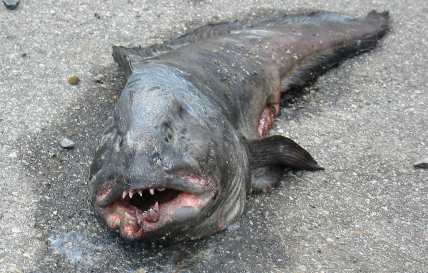-
 wolffish
wolffish
Protection sought for a sea brute
Others see no threat to mighty wolffish
By Carolyn Y. Johnson
Globe Staff / October 1, 2008
The fiercely ugly Atlantic wolffish, whose powerful jaw can reputedly break a broom handle, looks more like an underwater thug than a fish in distress - but scientists say this "Tasmanian devil with fins" is in rough shape.
Today, the environmental advocacy group Conservation Law Foundation will petition federal officials to add the US population of wolffish, also known as ocean catfish, to the endangered species list.
Environmentalists see the species as a potential "poster fish" for marine education. Known to diners for its firm white flesh and to biologists for its ability to crush other sea life in its viselike jaws, the wolffish has declined severely in population since the 1980s, according to scientific surveys and commercial fishermen's reported "bycatch" - fish caught in nets intended for others.
"We've known that wolffish are not in great shape for almost 10 years. Nothing we've done so far has helped the situation, so we need to up the ante," said Les Kaufman, associate director of the Boston University Marine Program, who has studied the wolffish on Stellwagen Bank.
Those who support the petition hope that the plight of the wolffish will draw attention to its neighborhood - the rocky, boulder-strewn sea floor, which can be disrupted when fishermen drag a net or trawl across the bottom.
"For most people, ocean species have turned into commodities that we eat - and apart from the fish they see in supermarkets, people can't really think too much about fish or what's going on with them," said Peter Shelley, director of the Massachusetts Ad vocacy Center of the Conservation Law Foundation. It was he who likened the wolffish to the ferocious marsupial of Tasmania.
"Hopefully we can turn it into an ecological moment. This is just a striking example of the degradation of oceans, and in particular the loss of a lot of this habitat and the diverse plants and animals."
That said, some diners would miss having wolffish - sometimes known by the more palatable name loup de mer (French for "wolf of the sea") - on the menu.
Rich Vellante, executive vice president and executive chef of Legal Sea Foods, said wolffish brings excitement to the dining table. His restaurant has been serving it for about six years. "It does have a pleasing sweetness, a mildness to it," Vellante said.
Wolffish, which can grow to nearly 5 feet long and weigh 40 pounds, make their home in rocky outcroppings off New England's coast as well as elsewhere in the Atlantic, are notable for more than just their crooked-teeth looks. They have molars strong enough to crush the shells of crabs and other crustaceans that form the bulk of their diet.
They are able to withstand extremely cold sea temperatures because of an antifreeze compound in their blood. They also have an unusual way of raising their young: After the female lays the eggs, the male takes over, standing guard for between four and nine months until the eggs hatch.
Since 2004, the wolffish has been listed in the United States as a "species of concern," a designation that comes with no protection.
The move to make the New England population of wolffish a protected endangered species comes against a backdrop of diminishing fish stocks in New England waters. Scientific trawl surveys taken each year show a steep decline in the wolffish population, amounting to an 86 percent drop between 1995 and 2006, according to an analysis by Richard Haedrich, a biologist and oceanographer. The abundance of the fish, as measured in the amount reported caught by commercial fishermen, peaked in the mid-1980s when the catch totaled 1,200 metric tons. By last year, the bycatch had dropped to 65 metric tons.
Fishermen interviewed yesterday expressed surprise that the wolffish would be considered for listing as endangered, and some said the stock may only seem depleted because fishing is more restricted today, thus automatically reducing the bycatch.
"What if it's determined two years after that ridiculous tag is put on wolffish that we finally did find out real numbers" and the stock was thriving? asked Vito Giacalone of the Northeast Seafood Coalition, an industry group. "Then we're throwing away probably the best eating fish in the ocean."
Fishermen and advocates both pointed out that the largest portion of the wolffish habitat is already closed to most commercial groundfishing. Thus the most immediate impact of protecting the species would probably be prohibiting recreational fishermen from taking wolffish.
Filing a petition is only a first step; the species still must meet the criteria for endangered species status. The National Marine Fisheries Service will have 90 days to review the petition and respond with a decision on whether to proceed. An extensive status review would be the next step before any declaration that they are endangered.
Even at this early stage, fishermen who have been fighting to maintain their livelihood through changing conditions express concern.
Barry Gibson, New England regional director of the Recreational Fishing Alliance, said he was surprised to hear of the effort and wants to study the data.
"I would certainly want to see more concrete information, scientific information," said Gibson, who had not heard anecdotally of a wolffish decline. The wolffish, he added, can be important to the livelihood of charter boat captains, who often find that catching one is the dramatic catch of the day.
"It's a fish that everybody's interested in," he said. "There's a lot of excitement when one is brought aboard."

http://www.boston.com/news/science/a...r_a_sea_brute/
-

Good article and on a fish I wouldn't think was in trouble. Ugly and scary but apparently vulnerable too! 
 Posting Permissions
Posting Permissions
- You may not post new threads
- You may not post replies
- You may not post attachments
- You may not edit your posts
-
Forum Rules



 Reply With Quote
Reply With Quote
